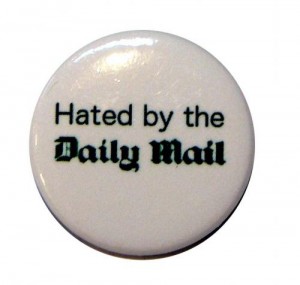 It should be quite obvious to all that read my blog that I am a left-wing liberal with socialist tendencies, a deep mistrust of authority and an intense dislike for right-wing views. I make no secret of this; I mention it in my “About” page and I state my views in my articles quite often. My views obviously shape my writing and introduce a bias into what I report. When I comment on actions of the police or on Conservative party policies I am usually negative about them because I disagree with them - this is a natural consequence of writing in a blog, or indeed of my writing at all. I choose what to write about based on what I think is important or on what inspires me, and negative things usually seem more important to me than positive ones. The same thing is obvious in social networks like Facebook and Twitter. Negative statements or reporting of news items seen as negative will always be shared, liked or retweeted more than positive ones. Statements with swearing doubly so.
It should be quite obvious to all that read my blog that I am a left-wing liberal with socialist tendencies, a deep mistrust of authority and an intense dislike for right-wing views. I make no secret of this; I mention it in my “About” page and I state my views in my articles quite often. My views obviously shape my writing and introduce a bias into what I report. When I comment on actions of the police or on Conservative party policies I am usually negative about them because I disagree with them - this is a natural consequence of writing in a blog, or indeed of my writing at all. I choose what to write about based on what I think is important or on what inspires me, and negative things usually seem more important to me than positive ones. The same thing is obvious in social networks like Facebook and Twitter. Negative statements or reporting of news items seen as negative will always be shared, liked or retweeted more than positive ones. Statements with swearing doubly so.
But is this right? After all, I really hate the Daily Mail for its bias. Nearly every headline that I see in it is something negative about things that I like or seems to me to have missed the point. Daily Mail stories show a clear bias in the opposite direction to that which I would like. They promote views that clash with mine, particularly when written by Melanie Philips, Richard Littlejohn or Quentin Letts. They often miss out facts that would detract from the impact of their stories. Further to that, they pick on people who I talk to and like, and they deliberately twist facts or even make them up to get a good story.
So what is the difference between what I write and what is written in the Daily Mail? I’ve thought about this quite a lot. Is it the format? Is there something inherently different about a blog and a tabloid in paper format? Probably not, since the Mail publish all their stories on their website, currently the second most viewed news website in the English speaking world. Perhaps it is in the size of the readership? I have perhaps two thousand visitors per month, while the Mail’s website has nearly forty million. But surely I have a responsibility to those two thousand people that visit my blog? Is it the expectations of the audience? After all, much of the audience of the Mail are expecting to read news as well as comment, while my audience are expecting comment alone. But what about when people read a news story as part of my comment? The difference narrows, since in both cases the news is presented in a cloud of carefully selected words to shape the bias of the story.
While I have had a blog for a long time and have commented on politics before, I only really started writing in depth less then a year ago. I am still being shaped as a writer. I started out with very intense comment with no effort at all to present a neutral view. More recently I have sometimes tried to make an effort to introduce a little less bias into my writing. That is for two reasons really, firstly because I would really like to inform those with a different point of view to me, and I know that strong visible bias does not help that, and secondly because I don’t want to be like the Daily Mail. Now I hope that I have not sunk to their level of personal attacks and of writing about irrelevant details of a persons life purely to shape a story, but I know that I do direct my anger and I do swear about those that anger me. There is a very fine line, and I would like to stay on the right side of it. It’s a difficult challenge. Writing about the arrests leading up to the royal wedding yesterday, I was conscious that I was angry, and that anger and bias was showing up in my writing and even in the comments I made to introduce each video. My choice of description could shape the whole article and I really wanted to write something that would make people on all sides think, not just people that already agree with me.
So in the end, what is the difference between my blog and a tabloid paper? I think of all the things that I mentioned above, the expectations of the audience has to be the main distinguishing factor. Additionally, I think the experience of the writer has to be taken into account. As I develop my writing skills I hope to be less biased and more factual. I want to appeal to a broader audience and to make people think and I can’t do that if I annoy them. At the same time, I don’t want to lose the attributes of my writing that make people actually want to read it. I’m probably going to retain a negative viewpoint overall, purely because those are the stories that attract my attention. So I’m going to be making an effort both to lose some bias and to keep my writing style, and maybe throw in something positive from time to time. I may fail in one of those things - It’s political correctness gone mad.

